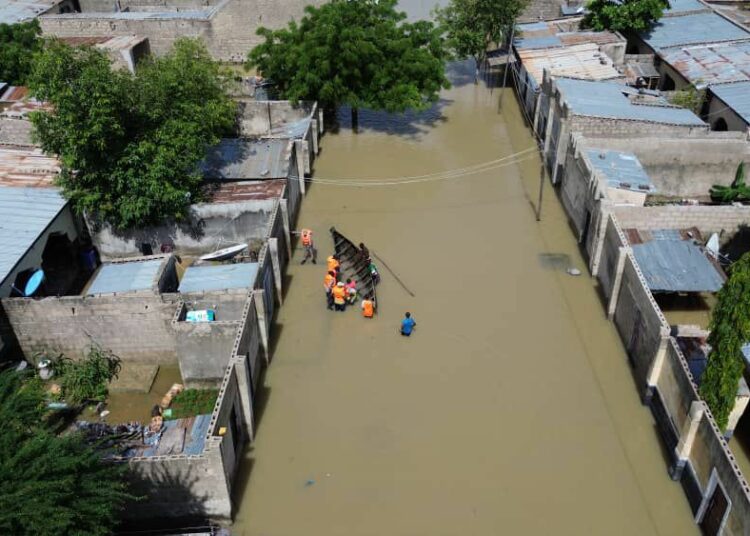The recent flood, which has submerged entire neighborhoods, destroyed farmlands, and displaced thousands of people, is being called one of the worst in the region’s history. Authorities have urged immediate evacuation of residents along riverbanks, as the overflowing dam threatens further destruction.
The Alau Dam, constructed between 1984 and 1986, was originally built to provide potable water and support irrigation activities in Maiduguri and its environs. However, structural defects discovered nearly a decade ago were never fully addressed. Despite repeated budget allocations by the Federal Ministry of Water Resources—over ₦432 million between 2020 and 2024 for dam rehabilitation—experts claim there is little evidence that substantial repairs were made.
The dam had previously overflowed in 1994, causing widespread flooding, but nothing of this magnitude. A recent analysis conducted by Ramat Polytechnic in 2015 warned of significant structural risks and recommended immediate de-sedimentation and expansion of the dam to prevent exactly what is happening now. The dam has been overstressed for years, holding twice its capacity, and was bound to overflow with this year’s heavy rainfall.
While the federal government attributes the flood to climate change and unprecedented rainfall, many experts point to mismanagement and human activities. Governor Babagana Zulum of Borno State acknowledged that both climate change and human encroachment into floodplains—despite previous demolition efforts—worsened the situation. Over 4,000 homes built along the waterways were demolished in past efforts to curb flooding, but many more remained.
A Disaster Foretold: Years of Neglect
Built in 1986, the Alau Dam was originally designed to provide water for irrigation and domestic use. However, years of neglect and a lack of proper maintenance have left the dam vulnerable to the overflow that occurred last week. According to experts, defects in the dam’s structure were first identified over nine years ago, yet nothing was done despite repeated budgetary allocations by the Federal Government for its rehabilitation.
Budget Breakdown:
2020: N285 million\ 2021: N80 million\ 2022: N37.6 million\ 2024 Appropriation Bill: N30 million
Despite these funds being earmarked, no evidence suggests that repairs were ever made. In fact, documents obtained show that the Federal Ministry of Water Resources and the Chad Basin Development Authority (CBDA) did not adequately maintain the dam, leaving it ill-prepared for this year’s torrential rains.
Climate Change or Human Error?
While the Minister of Water Resources, Prof. Joseph Utsev, has attributed the dam’s overflow to excessive rainfall and climate change, experts and public affairs analysts argue otherwise. They insist that the dam’s collapse could have been prevented through timely rehabilitation, and that climate change is being used as a convenient scapegoat for what is ultimately a human-made disaster.
A Health Crisis in the Making
As the floodwaters recede, concerns over waterborne disease and contamination grow. The University of Maiduguri Teaching Hospital (UMTH) has reported fears of radioactive contamination from submerged medical equipment, though authorities assure the public that levels remain within acceptable limits. However, medical experts are more concerned about the potential spread of diseases due to the widespread contamination of drinking water.
Thousands of displaced residents are struggling to access safe drinking water and sanitation facilities. Relief camps, such as Bakassi Camp, are overwhelmed with survivors, many of whom are forced to rely on contaminated floodwaters for daily activities, increasing the risk of cholera and other infectious diseases.
Experts are calling for immediate rehabilitation of the Alau Dam and a nationwide review of dam management practices to prevent future disasters. While rescue missions are ongoing, there is a growing sense of frustration over the government’s failure to prioritize the dam’s maintenance, despite consistent budget allocations for repairs.
Humanitarian Crisis: Growing Fears of Disease
As floodwaters recede, Maiduguri faces another looming crisis: the spread of waterborne diseases. Thousands of displaced people are struggling to access safe drinking water, while others are resorting to using contaminated floodwaters for daily activities. Health experts warn of a high risk of infections and waterborne diseases such as cholera and typhoid.
Medical experts at the University of Maiduguri Teaching Hospital (UMTH) have also raised concerns over possible chemical contamination from submerged medical equipment, including radioactive materials used in the hospital’s cancer centre.
Dr. Abubakar Ngubdo, Chairman of the Association of Resident Doctors, has called on authorities to tackle this impending health crisis, warning that “there is severe contamination of surface water, and the risk of disease spread is high.”
In the wake of this disaster, relief efforts have ramped up. The Nigerian Air Force (NAF) has begun airlifting relief materials to flood-hit areas, while the Kano State government has donated N100 million to aid victims. International bodies such as the World Health Organization (WHO) have also pledged support, with their representatives visiting Maiduguri to assess the damage and mobilize resources.
However, the scale of the disaster has overwhelmed local relief efforts. At various camps housing displaced persons, complaints of poor sanitation and open defecation are widespread, further increasing the risk of disease outbreaks. Water tanks provided at these camps are insufficient, forcing many to rely on unsafe water sources.
Public outcry over the handling of the dam’s maintenance has reached new heights, with demands for accountability from both the Federal Ministry of Water Resources and the CBDA. Residents and experts alike are questioning where the budgeted funds went and why the dam’s rehabilitation was never prioritized.
“This is not just a natural disaster. It’s a failure of governance,” said Engr. Toyin Ajeigbe, a water engineer.
“The signs were there, but nothing was done. Now, the people are paying the price.”
– Uche, an Esquire, writes from Abuja and can be reached via: [email protected]











